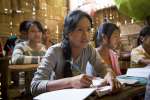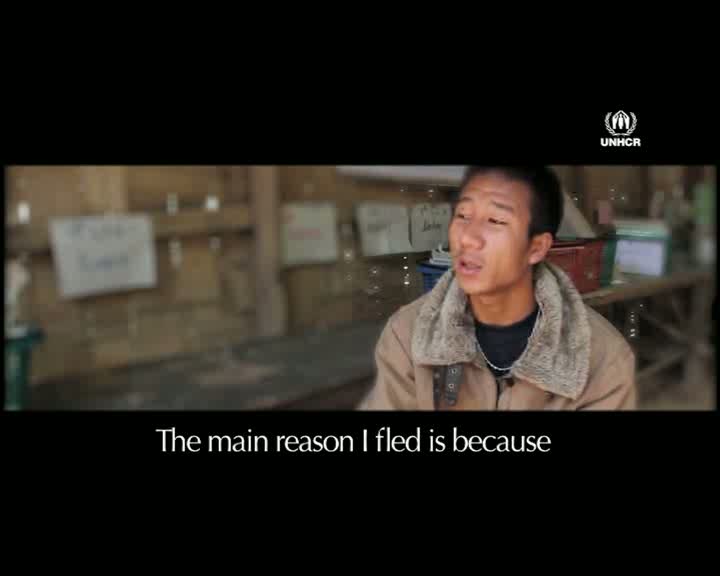- Text size
 |
|  |
|  |
| 
- عربي
Some 25,000 risk sea crossings in Bay of Bengal over first quarter, almost double from year earlier
News Stories, 8 May 2015
BANGKOK, Thailand, May 8 (UNHCR) – A UNHCR report released on Friday said that despite the risks, an estimated 25,000 Rohingya and Bangladeshis boarded smugglers' boats on the Bay of Bengal between January and March this year – almost double the number over the same period in 2014.
The finding came in the latest Irregular Maritime Movements in South-East Asia report, through which the UN refugee agency has been highlighting its concerns about the Bay of Bengal crossings and advocating with governments for urgent action since August last year.
UNHCR staff spoke to several hundred survivors of such journeys during the reporting period. Their accounts signal a shift in how smugglers recruit passengers for the boats. Initial boarding fees are often low and in some cases people are given free passage on condition that they repay the debt with future earnings in Malaysia. There may be false promises of work and even small cash incentives offered.
Those who change their minds and ask to be let off the boats are forced to remain. UNHCR staff heard of children being abducted off the streets or while fishing, and forced onto boats. People are unaware that money will be extorted from them later in the journey and what started with being smuggled, soon turns into trafficking in people.
Based on survivor accounts, UNHCR estimated that 300 people died at sea in the first quarter of 2015 as a result of starvation, dehydration or abuse by boat crews. One survivor who spent 62 days in such conditions compared it to a graveyard and said he lost hope of reaching shore alive.
The report said the most commonly-described route has boat passengers disembarking in the Ranong area of southern Thailand, followed by a day-long road trip to smugglers' camps towards the border with Malaysia.
Conditions in the smugglers camp are horrific. People are held and abused until their relatives pay for their release. More than half the survivors interviewed by UNHCR since October reported that someone died in the smuggler's camp where they were held. Beatings are common and there are reports of rapes. Those who try to escape, risk being shot.
In Geneva, spokesman Adrian Edwards said: "UNHCR understands that since last October, some smugglers have abandoned onshore camps in Thailand in favour of holding passengers for ransom at sea. Once payment is made, people are taken by fishing or speed boats directly to Malaysia. According to NGO, The Arakan Project, currently several thousand people could be held – and dozens could have already died – in these 'offshore camps'."
Those who eventually made it to Malaysia were in bad shape. In the first three months of this year, UNHCR Malaysia saw 61 Rohingya arrivals with symptoms of beriberi caused by Vitamin B deficiency. Those who could earn some money in the informal sector had to pay off debts to people who paid for their release, often with high interest rates.
With people rescued from smugglers camps in Thailand, UNHCR assists by providing clothes, blankets, hygiene kits and other relief. "Our teams also conduct interviews and counselling. We help reunite families who have been split during the journey. We also identify possibilities of resettlement to third countries for the most vulnerable," Edwards said.
In Malaysia, UNHCR conducts protection monitoring in Rohingya communities and intervenes for the release of those known to be in detention for arriving irregularly. The UNHCR office also supports refugee communities in the implementation of livelihood, community development or skills-building and education projects.
The report release comes soon after UNHCR's office in Thailand learned from the authorities and media reports that more than 30 bodies had been found in graves in smugglers' camps in the southern province of Songkhla, close to the border with Malaysia. The bodies were said to be of people originating from Myanmar and Bangladesh, who had likely died from illness or abuse. Some of these may well have been people seeking international protection.
"UNHCR welcomes that the Thai police are investigating this and we hope the culprits will be identified and brought to justice. But we are also appalled by these deaths. Smuggling networks by sea from the Bay of Bengal area to Thailand and onwards to Malaysia have become increasingly lucrative for smugglers, and increasingly dangerous for their human cargoes," Edwards said in Geneva.
Considering the growing scale and severity of the boat exodus, he said UNHCR called on countries in the region to work more closely together to counter the smuggling and trafficking of vulnerable people. Law enforcement measures must also be accompanied by efforts to reduce the need for migrants and refugees to turn to smugglers in the first place.
In Myanmar's Rakhine state – where many of the smuggling victims originate – UNHCR has long advocated for and stands ready to support concerted efforts to stabilize the situation through reconciliation, the realization of rights for all, socio-economic equality and addressing issues related to citizenship.
UNHCR's report is available at http://www.unhcr.org/554c6a746.html.































